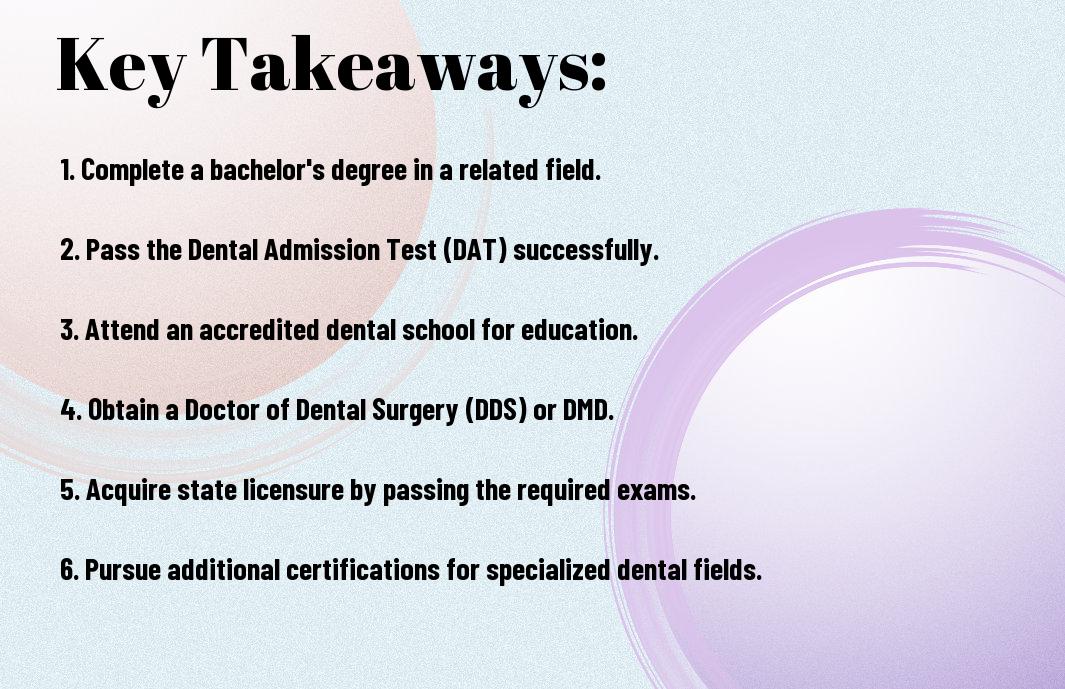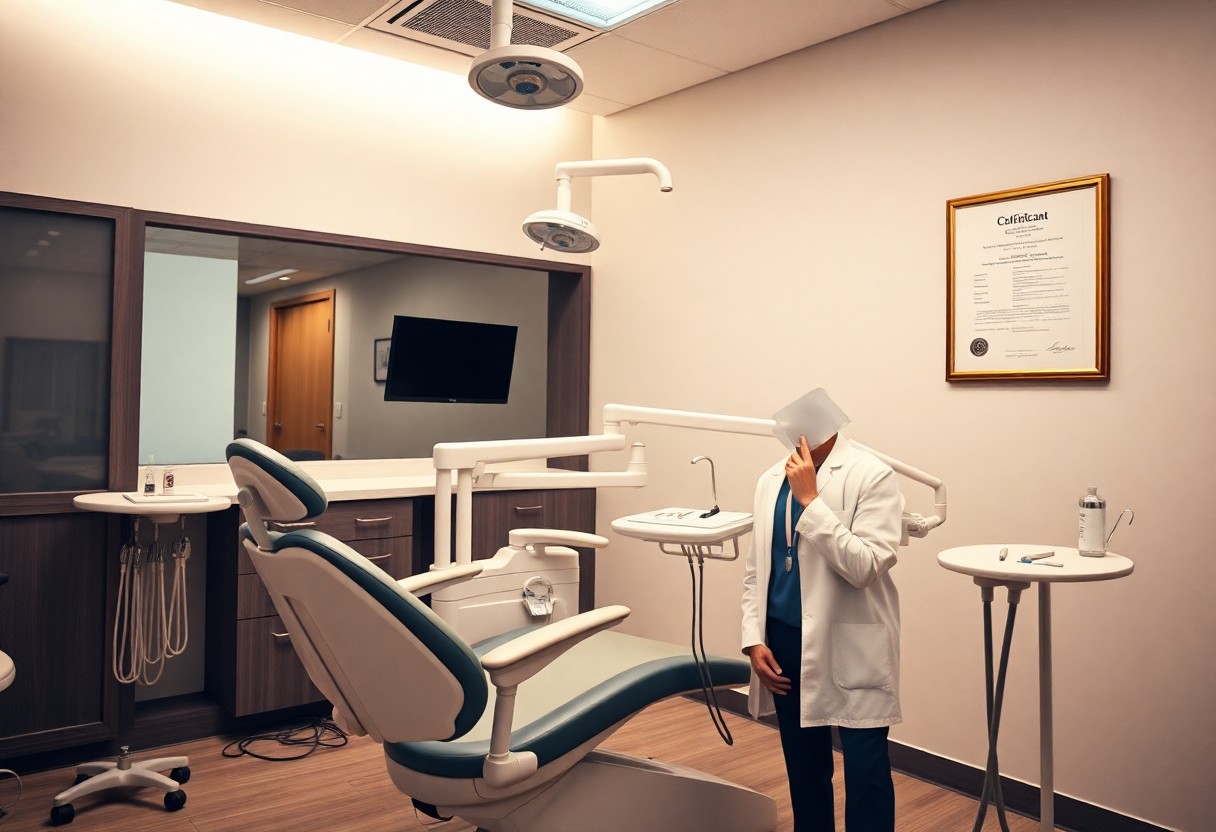Dentist qualifications are important for ensuring you are equipped to provide the best possible care to your patients. To commence on this rewarding career path, you will need a strong educational foundation, including a bachelor’s degree, followed by a dental degree from an accredited dental school. Additionally, passing state and national licensure exams is mandatory. Throughout the process, gaining clinical experience and developing your skills will be vital in preparing you for the diverse challenges you will face as a dental professional.
Key Takeaways:
- Educational Path: A bachelor’s degree is typically required, often with a focus on science courses such as biology and chemistry.
- Dental Admission Test (DAT): Aspiring dentists must take the DAT, which assesses academic ability and scientific knowledge, to gain admission to dental school.
- Dental School: Completion of a Doctor of Dental Surgery (DDS) or Doctor of Dental Medicine (DMD) degree from an accredited dental program is mandatory.
- Licensing: After dental school, passing national and state exams is necessary to obtain a license to practice dentistry.
- Continuing Education: Dentists are required to participate in ongoing education to stay updated with the latest practices and technologies in dentistry.


Educational Requirements
While becoming a dentist requires dedication and extensive education, understanding the necessary steps can help you streamline the process. To explore the comprehensive pathway for entering the field, check out How To Become a Dentist in 6 Steps (With Salary and FAQs). Your journey begins with high school preparation, followed by obtaining an undergraduate degree before applying to dental school.
High School Preparation
For aspiring dentists, high school is the perfect time to build a strong foundation in the sciences. Focus on courses such as biology, chemistry, and mathematics, which not only strengthen your knowledge but also prepare you for advanced studies. Additionally, participating in volunteer work or shadowing a dentist offers valuable insights into the profession.
Undergraduate Degree
About dental schools require applicants to have an undergraduate degree, preferably with a focus on science to give you an edge. Common majors include biology or chemistry, but you may also choose other fields as long as you meet the necessary course requirements.
This degree is critical for gaining acceptance into dental school and sets the stage for your dental education. During your undergraduate studies, it’s beneficial to excel in your courses and build a solid GPA. Participation in extracurricular activities, particularly those related to health or volunteering, can strengthen your dental school applications. Use this time to prepare for the Dental Admission Test (DAT), as your scores will also be a key factor in the admissions process.
Dental Admission Test (DAT)
Any aspiring dentist must take the Dental Admission Test (DAT), which assesses your knowledge and skills in areas vital for success in dental school. This standardized exam evaluates your readiness for the rigorous academic challenges ahead and plays a significant role in your dental school application process, making it a vital step toward achieving your career goals.
Test Overview
Across various sections, the DAT covers key subjects such as biology, chemistry, and perceptual ability. The test is designed to evaluate not only your knowledge but also your critical thinking skills and problem-solving abilities. Understanding the test format and content will help you prepare effectively and perform confidently.
Scoring and Importance
By achieving a competitive score on the DAT, you increase your chances of gaining admission into a reputable dental school. Your score is a vital component of your application, alongside your GPA and extracurricular activities, as it reflects your academic aptitude and commitment to the field of dentistry.
Indeed, understanding the significance of your DAT score is vital as it can influence your acceptance into dental programs. Many schools have specific minimum score requirements, so aim to excel in the test to strengthen your application. A high score not only distinguishes you from other candidates but also demonstrates your dedication and readiness for the challenges ahead in dental school and beyond.
Dental School Curriculum
Keep in mind that the dental school curriculum is designed to provide you with a comprehensive understanding of dental sciences and patient care. You will engage in both theoretical learning and practical applications, covering various subjects imperative for your future practice. For more information on the path to becoming a dentist, you can check out Dentist Requirements: What It Takes To Become A Dentist.
Core Courses
Courses in dental school include subjects like anatomy, biochemistry, microbiology, and pharmacology. These foundational courses are imperative for helping you understand the human body and the science behind dentistry. The knowledge you gain will be instrumental when you diagnose and treat patients in your professional career.
Clinical Training
Against the backdrop of your academic learning, clinical training provides hands-on experience in a dental setting. You will work with real patients under the supervision of qualified faculty, allowing you to apply what you’ve learned in the classroom to practical situations.
Further, the clinical training aspect of your dental education is critical as it develops your skills in patient assessment, diagnosis, and treatment planning. You will gain experience in different areas of dentistry, such as restorative, preventive, and surgical techniques, which will prepare you for successful practice after graduation. This immersive training cultivates your confidence and competence in delivering dental care to patients.
Licensure and Certification
Not only do you need to complete your dental education, but you also must obtain licensure to practice as a dentist. Each state has specific regulations that you must adhere to, ensuring that you meet the necessary qualifications to provide dental care safely and effectively. Obtaining licensure often involves passing exams and meeting additional requirements set by the state dental board.
National Board Dental Examinations
With your dental education completed, the next step is to pass the National Board Dental Examinations (NBDE). This comprehensive exam evaluates your understanding of dental sciences and clinical concepts. It is important to excel in these examinations, as passing is a prerequisite for obtaining your state license, paving the way for your professional practice.
State Licensure Requirements
Board requirements for licensure vary by state, so you must familiarize yourself with your state’s specific criteria. This typically includes submitting proof of your education, passing the NBDE, and sometimes completing a clinical exam. You may also need to provide proof of your character and moral standing, further emphasizing the importance of ethical practice in dentistry.
The exact requirements for state licensure can vary significantly across different regions. You should check with your state’s dental board for detailed guidelines, including any necessary documentation and application procedures. Additionally, some states may require continuing education courses to maintain your licensure, ensuring that you stay current with advancements in dental practice and technology.
Specialization Options
All dentists have the opportunity to enhance their careers through specialization. This allows you to focus on specific areas of dentistry, catering to unique patient needs and expanding your skills.
Types of Dental Specialties
All dentists can choose various specialty fields that align with their interests. Here are some common dental specialties:
- Orthodontics
- Pediatric Dentistry
- Oral and Maxillofacial Surgery
- Periodontics
- Endodontics
Perceiving a niche in these areas can enhance your practice and patient experience.
| Specialty | Focus Area |
| Orthodontics | Aligning teeth and jaws |
| Pediatric Dentistry | Dental care for children |
| Oral and Maxillofacial Surgery | Surgical treatment of facial injuries |
| Periodontics | Gum care and treatment |
| Endodontics | Treatment of dental pulp |
Additional Training Requirements
Above completing your dental degree, you will need to undergo additional training for specialization. This usually involves a residency program specific to your chosen field and may last from two to six years, depending on the specialty.
Also, during this time, you will gain hands-on experience, working under the supervision of experienced specialists, which is vital for developing expertise. You may also advance your knowledge through various board certifications and continuing education courses post-residency, ensuring you stay current with advancements in your specialty and maintaining your skills.
Skills and Attributes
Now, becoming a successful dentist requires a combination of technical skills and personal attributes. You must be adept at performing precise procedures while also being able to communicate effectively with patients. Your ability to not only correct dental issues but also to foster a caring environment is key to building patient trust and a thriving practice.
Essential Skills for Dentists
Beside technical expertise, you must possess strong analytical skills to diagnose conditions and develop effective treatment plans. Your manual dexterity, attention to detail, and problem-solving abilities will enable you to perform complex procedures with confidence and skill.
Interpersonal Qualities
Essential to your success as a dentist are the interpersonal qualities that help forge lasting relationships with your patients. Your ability to empathize, listen, and communicate clearly will ensure they feel valued and understood throughout their treatment journey.
In fact, the way you interact with patients can significantly impact their overall experience and satisfaction. Being approachable and friendly helps to create a comfortable atmosphere, which can alleviate anxiety and promote open communication. Your interpersonal skills play a vital role in not just treating dental problems but also guiding patients in preventative care and building long-term loyalty to your practice.
To wrap up
Hence, to become a dentist, you need to complete a bachelor’s degree, excel in dental admissions tests, and earn a dental degree from an accredited institution. After obtaining your degree, passing the licensure exams is important for practice. Additionally, pursuing specialized training can enhance your expertise in specific areas of dentistry. With dedication and commitment to education, you can successfully begin on a rewarding career in this vital healthcare field.
FAQ
Q: What educational background is required to become a dentist?
A: To become a dentist, you first need to complete a bachelor’s degree, often with a focus in sciences such as biology or chemistry. After earning your undergraduate degree, you must attend dental school, which typically requires an additional four years of study in dental medicine or dental surgery. Upon graduation from dental school, you will receive either a Doctor of Dental Surgery (DDS) or Doctor of Dental Medicine (DMD) degree.
Q: Are there specific exams I must take to pursue a career in dentistry?
A: Yes, aspiring dentists must take and pass the Dental Admission Test (DAT) during their undergraduate studies to apply to dental schools. After completing dental school, candidates must also pass national and state licensing exams to practice dentistry. These exams usually include both a written portion that tests your dental knowledge and a clinical exam that assesses your practical skills.
Q: What additional training or residencies might I need after dental school?
A: After completing dental school, many dentists choose to participate in a residency program, particularly if they wish to specialize in fields such as orthodontics, oral surgery, or pediatric dentistry. Residency programs typically last between one to several years, depending on the specialty. While some dentists enter the workforce directly after dental school, postgraduate training can enhance skills and improve career opportunities in specialized areas of dentistry.






